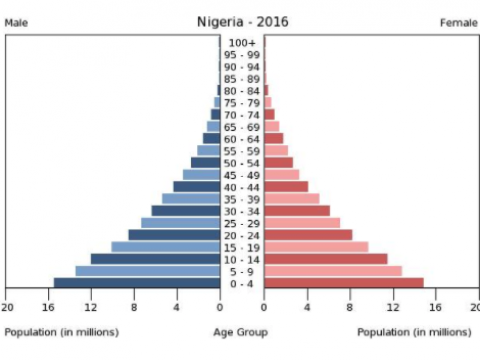NDI staff Lauren Kitz and Jesper Frant lead YIAGA through a visioning and reflection workshop on its #NotTooYoungToRun campaign.
Margaret Mead is quoted as saying, “never doubt that a small group of thoughtful, committed citizens can change the world; indeed, it's the only thing that ever has.” In late February, I traveled to Abuja, Nigeria to meet with one such group of thoughtful, committed citizens.
The Youth Initiative for Advocacy Growth and Advancement (YIAGA) is one of Nigeria's preeminent youth organizations. YIAGA, along with the Youngstars Development Initiative (YDI), has conducted a very successful advocacy effort to lower the eligibility age to run for elected office in Nigeria. From humble beginnings, the #NotTooYoungToRun campaign has grown into a national movement.
Nigerians become eligible to vote at 18. Once eligible to vote, politically-motivated youth must wait another 12 to 22 years to be eligible to run for elected office. This policy seems foolhardy in a country where youth account for 60 percent of the population and 55.4 percent of the voting-age population. This "youth buldge" is both an opportunity and a potential challenge. By marginalizing young people from full participation in the political process, Nigeria is missing a huge opportunity to harness their creativity, energy and inspiration for national development. On a darker note, violence may ultimately be the cost of their political exclusion. Noting the mass violence unleashed by Boko Haram, one YIAGA member pointed out, “the ruling elite in the north have not come to terms with the resentment of young people about their exclusion.”
The #NotTooYoungToRun bill seeks to take on one barrier to youth representation in political leadership. The bill seeks to amend the constitution, reducing the eligibility age for President from 40 years to 30 years; Governor 35 to 30; Senate 35 to 30; House of Representatives 30 to 25; and State House of Assembly 30 to 25. Through YIAGA’s tireless efforts, the amendment seems poised to pass the National Assembly and move on to ratification by the states.
So why has the #NotTooYoungToRun campaign been so successful? Samson Itodo, the executive director of YIAGA, said that while the campaign had started in 2009 it didn’t begin to gain traction until 2015 when previous efforts consolidated on increasing political will and compelling campaign branding. The full answer is complicated and will be a main focus of YIAGA’s forthcoming toolkit for youth activists, but they identified a few key lessons:
- Narrative is powerful - “We didn’t have a campaign until we came up with the hashtag.”
- Build a movement - “It’s not about one organization.”
- Focus on partnerships that work - “Legislative-civil society collaboration was key.”
- Stop agonizing and organize!
Even as the national #NotTooYoungToRun campaign continues to gain momentum, the African Union and the United Nations have shown interest in replicating YIAGA’s success. The UN launched its own global Not Too Young To Run campaign, and the AU has expressed interest in working with YIAGA to provide guidance to enable other youth groups across sub-Saharan Africa to achieve greater youth representation in the political leadership of their own countries.
While the tide is moving in YIAGA’s favor, there is still a lot of work to do. They will need all of their creativity and fortitude to see this amendment through to full passage.

